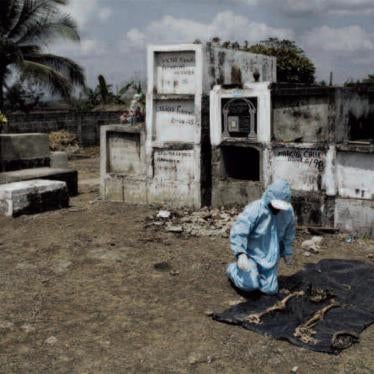The administration of President Álvaro Uribe is jeopardizing efforts to secure justice for crimes committed by paramilitaries and their accomplices in Colombia, Human Rights Watch said in a report released today.
The 140-page report, "Breaking the Grip? Obstacles to Justice for Paramilitary Mafias in Colombia," assesses Colombia's progress toward investigating and breaking the influence of paramilitaries' mafia-like networks. It also describes government actions that pose serious obstacles to continued progress. The report is based on interviews with prosecutors and investigators, case files, witness testimony, and other material collected over the course of more than one year of research in Colombia.
"Colombia's justice institutions have made enormous progress in investigating paramilitaries and their powerful friends," said José Miguel Vivanco, Americas director at Human Rights Watch. "But the Uribe administration keeps taking steps that could sabotage these investigations."
Colombia's paramilitaries have committed crimes against humanity and other atrocities, including thousands of killings, massacres, threats, enforced disappearances, and forced displacement of civilians. They have amassed enormous wealth and influence, in part through mafia-style alliances with members of the military, politicians, and businesspeople.
In the last two years, Colombia's Supreme Court has made unprecedented progress in investigating accusations against members of the Colombian Congress of collaborating with the paramilitaries. More than 60 members - nearly all from Uribe's coalition - have come under investigation. And, in confessions to prosecutors, paramilitary commanders have started to disclose the details of some of their atrocities and to name accomplices in politics and the military.
The report explains that the progress made is the outcome of a fortuitous combination of factors, which include:
- A Constitutional Court ruling that significantly improved Colombia's Justice and Peace Law, creating incentives for paramilitary commanders to disclose some of the truth about their crimes.
- The independence and courage of a select group of Supreme Court justices and prosecutors, who have pushed forward investigations of paramilitary infiltration in the political system. Members of Colombian civil society and several journalists also helped to uncover information that nourished the investigations.
- International pressure - including the delay of the US-Colombia Free Trade Agreement - has in some cases prevented the government from trying to let paramilitaries' accomplices off the hook.
But the Uribe administration has repeatedly taken actions that threaten to undermine this progress, including:
- Repeatedly issuing public personal attacks on the Supreme Court and its members, in some cases making accusations that have turned out to be baseless, in what increasingly looks like a campaign to discredit the court.
- Proposing constitutional amendments that would remove what are known as the "parapolitics" investigations from the jurisdiction of the Supreme Court.
- Opposing and blocking meaningful efforts to reform the Congress to eliminate paramilitary influence.
In addition, the extraditions of several top paramilitary commanders to the United States, at a time when several of them were starting to talk about their human rights crimes and accomplices, have interrupted ongoing investigations in Colombia. The extraditions are positive in that they may have broken the groups' chains of command and have increased the likelihood that these commanders will serve lengthy prison terms for their drug crimes, but they may prove fatal to obtaining justice for other atrocities.
Human Rights Watch noted that at this time, more than ever, international pressure on Colombia is crucial to ensure that Colombia's Supreme Court and other institutions of justice are able to proceed unhampered.
"Without significant oversight and pressure from the international community, the enormous efforts made by Colombia's courts and prosecutors to hold paramilitaries' accomplices accountable could easily be squandered," said Vivanco.
Human Rights Watch noted that many paramilitary crimes may fall under the jurisdiction of the International Criminal Court. Paramilitaries' accomplices could also become subject to investigation if Colombian authorities fail to bring them to justice.
"The burden is now on the Uribe administration and Colombia's institutions of justice to ensure that paramilitaries, as well as their accomplices, are held accountable for their crimes," said Vivanco.
The report also recommends that the US Department of Justice use the tools at its disposal to further accountability and the dismantling of paramilitaries' structures. The Department of Justice has jurisdiction to prosecute some of the paramilitary leaders for acts of torture committed in Colombia. During plea bargaining, it should also create incentives to ensure that they disclose information, not only about their drug crimes, but also their atrocities and network of accomplices.







